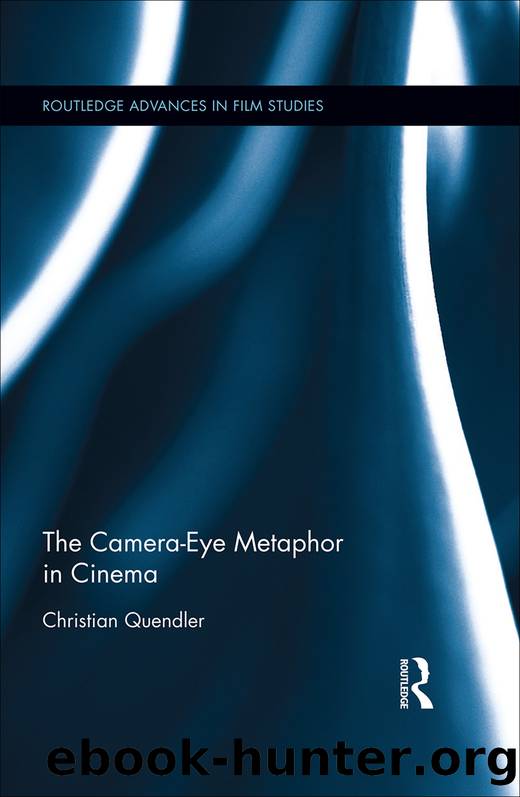The Camera-Eye Metaphor in Cinema by Christian Quendler

Author:Christian Quendler
Language: eng
Format: epub
Publisher: Routledge
Published: 2017-08-15T00:00:00+00:00
Autopsy and Autography
Jörg Dünne and Christian Moser introduced the term automediality to address the dynamic constitution of identity through media practices.20 As Foucault has argued in Technologies of the Self, self-reflection inevitably involves a medium of reflection through which the self becomes available as a subject of exploration.21 In the first decades of cinema, the question of what it means to ‘see’ and ‘write’ with a camera pervades countless stories featuring not only cameramen and photographers but also all kinds of investigators and detectives. I will refer to such reflexive gestures as acts of autopsy and autography. They can be minimally defined as personal acts of witnessing and recording that resonate with reflexive meanings or ‘self-view’ or introspection and affirming one’s identity or ‘underwriting.’ Viewed within a framework of automediality, the prefix ‘auto’ assumes a productive ambiguity that juxtaposes the sense of self with the mechanical automatism of the camera.
I want to introduce autopsy and autography by addressing their representational, ethical and aesthetic implications. I will situate these terms in relation to what Jacques Rancière has referred to as the ethical, representational and aesthetic regimes of art.22 The ethical regime concerns the social function of art. Ethics is understood here in a pragmatic sense that focuses less on norms of good ethical behavior than on the subject’s situation in a scene that is described in ethical terms. Accordingly, the ethical dimension of images and media can be described in values that qualify their social uses and effects (e.g. diverting vs. instructive or harmful vs. beneficial). The representational dimension refers to the means and techniques of artistic expression as a repertoire of formal conventions, which Rancière relates back to the ancient meaning of art as a craft. By contrast, the aesthetic regime is understood in a distinctly modern sense. It describes a realm of reflection and intervention where representational conventions and ethical values are suspended, interrogated and negotiated. Whereas autopsy charges experience with claims of authenticity, autography endows an act or a production with a sense of authority. The ethical bearings of autopsy and autography result from the sense of authenticity and authority that they connote. Both autopsy and autography specify an ethical subject that is situated and liable with all its moral implications.
The assertion of having witnessed something with one’s own eyes situates the observer in the immediate context with the observed. The emphasis on the situational context in acts of autopsy can be associated with certain representational conventions. As an important trope in travel literature, the autopsy principle does not only focus on detailed descriptions of objects or events observed, it also includes minute descriptions of the observer’s personal circumstances, his or her thoughts and habits.23 Whereas the claims of authenticity in autopsy deal primarily with the witnessing experience, autography asserts authenticity by claiming authority over the production and representation of the experiential content. The autograph quite literally vouchsafes for the authenticity of an expression and its author. Autography extends its literal meaning when it promises to trace something about the writer or the writing that is irreplaceable and individual.
Download
This site does not store any files on its server. We only index and link to content provided by other sites. Please contact the content providers to delete copyright contents if any and email us, we'll remove relevant links or contents immediately.
Call Me by Your Name by André Aciman(20489)
Ready Player One by Cline Ernest(14636)
How to Be a Bawse: A Guide to Conquering Life by Lilly Singh(7466)
Wiseguy by Nicholas Pileggi(5767)
The Kite Runner by Khaled Hosseini(5163)
On Writing A Memoir of the Craft by Stephen King(4927)
Audition by Ryu Murakami(4922)
The Crown by Robert Lacey(4805)
Call me by your name by Andre Aciman(4676)
Gerald's Game by Stephen King(4640)
Harry Potter and the Cursed Child: The Journey by Harry Potter Theatrical Productions(4491)
Dialogue by Robert McKee(4386)
The Perils of Being Moderately Famous by Soha Ali Khan(4211)
Dynamic Alignment Through Imagery by Eric Franklin(4207)
Apollo 8 by Jeffrey Kluger(3702)
The Inner Game of Tennis by W. Timothy Gallwey(3674)
Seriously... I'm Kidding by Ellen DeGeneres(3627)
How to be Champion: My Autobiography by Sarah Millican(3582)
Darker by E L James(3512)
